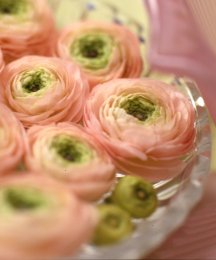|
How the industry operates
Distribution
- Transportation
- In-flight Care - Pot
Plants - Importing
Flowers are grown on a global scale. The biggest flower-growing nations are the
Netherlands, Colombia, Kenya and Israel, but many other countries like South Africa,
Ecuador and Malaysia are now investing in the industry. Most countries grow the
"top ten" best selling flowers, but many are starting to export indigenous
crops. These may be common plants in their native country but are welcomely unusual
in the UK. For a full list please see our page on sources of import.
Many flowers are also still grown in the UK, although the majority of flowers
sold here are imported. The Channel Islands are famous for freesia, iris and roses;
Cornwall, Lincolnshire and Scotland grow lots of bulb flowers (indeed Lincolnshire
growers export daffodils to Holland!) UK growers also produce lilies, summer flowers
such as delphiniums and pinks, and large quantities of chrysanthemums.
Distribution
Flowers take a number of routes to the consumer, depending on where they are grown
and how they are to be sold. Some growers cut and pack flowers at their nurseries,
sending them directly out to the consumer by mail order. Some flowers are sent
to packing companies, who grade the flowers and arrange them in bunches for sale
onto the supermarkets or to deliver by mail order. Some flowers are graded and
sleeved by the growers and sold to wholesale markets; the wholesalers then sell
them on to florists who condition and arrange the flowers for the consumer. Transportation
Some flowers are sent packed flat in boxes. This enables large amounts of flowers
to be packed in small spaces like aircraft holds. Other flowers cannot survive
for long periods out of water. These are either sent with their own little water
holders on each stem end - for more expensive or tropical flowers - or are transported
in buckets of water. The latter method extends the life of flowers and reduces
labour time as flowers are ready for sale, but obviously also reduces the amount
of flowers that can be transported as they are much heavier than dry-packed flowers
and hence air transportation charges are higher. In-flight
care
Flowers coming from abroad must be sent with care and speed to
arrive in the UK in a good condition. Many exporters cut the flowers, and pack
them on the way to the airport to save time; flowers are often kept in refrigerated
conditions at the airport and flown in cooled planes. Special refrigerated lorries
transport the flowers to the packers or wholesalers. The less time the flowers
spend in transit, the longer time the customer has to enjoy them. Pot
Plants
Pot plants, because of their weight, are usually traded over
shorter distances. About half the indoor plants sold in the UK are home-grown,
compared to just under a third of the cut flowers sold. Most of the UK-grown plants
are flowering ones. We import the rest mostly from Denmark, Holland and Belgium.
The majority of pot plants in the UK are bought from DIY superstores and supermarkets,
with garden centres also selling large quantities. Importing
If your company wishes to import products into the UK, the first point
of contact is the Dept for Environment,
Food and Rural Affairs (DEFRA). DEFRA issues Plant Health Passports, and determines
quality guidelines. For a full copy of import regulations call +44 1904 455192
or email: PlantHealth.Info@defra.gsi.gov.uk For information on Lincolnshire
Growers please see the Lincolnshire
Ornamental Challenge website.

back |








